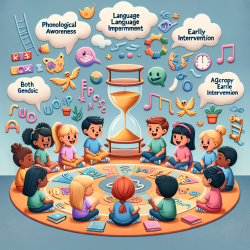As a practitioner dedicated to enhancing the communication skills of children, it's crucial to stay informed about the latest research and evidence-based interventions. One such significant study is the "Effectiveness of Phonological Awareness Intervention for Kindergarten Children with Language Impairment" by Cecelia Hund-Reid and Phyllis Schneider. This research highlights the impact of targeted phonological awareness (PA) interventions on kindergarten children with moderate to severe language impairments.
The study involved 37 kindergarten children aged between 4;9 and 6;3 years who demonstrated moderate to severe language impairments and low PA skills. These children were randomly assigned to either an experimental group that received PA and letter-sound awareness intervention or a control group that received no intervention. The intervention was delivered by educational assistants in small groups for 14 weeks, 20 minutes per day, five days a week.
Key Findings
- Children in the experimental group made significantly greater gains in initial sound fluency, phonemic segmentation fluency, and nonsense word fluency compared to the control group.
- The results were maintained for at least one month after the intervention ended, demonstrating the lasting impact of the PA intervention.
Implications for Practice
For practitioners, these findings underscore the importance of implementing direct, explicit, and intensive PA interventions for children with language impairments. Here are some actionable steps to consider:
- Implement Small Group Sessions: Small group settings (e.g., two children per group) provide more opportunities for individualized attention and feedback, which are crucial for children with language impairments.
- Focus on Phonemic Segmentation and Blending: Activities that involve identifying, segmenting, and blending phonemes are particularly effective. These skills are foundational for early literacy development.
- Incorporate Letter-Sound Awareness: Combining PA activities with letter-sound awareness can enhance the effectiveness of the intervention, leading to better reading outcomes.
- Train Educational Assistants: With proper training, educational assistants can effectively deliver PA interventions, making it feasible to implement these programs within existing school structures.
Encouraging Further Research
While this study provides compelling evidence for the effectiveness of PA interventions, further research is needed to explore the long-term impact on reading skills and the best practices for integrating these interventions into classroom settings. Practitioners are encouraged to engage in or support research initiatives that continue to refine and improve PA interventions for children with language impairments.
To read the original research paper, please follow this link: Effectiveness of Phonological Awareness Intervention for Kindergarten Children with Language Impairment.










